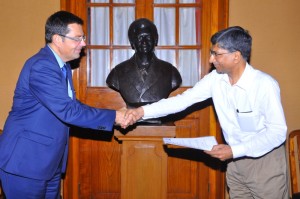
Thales Vice-President and Country Director Mr. Antoine Caput with IISc Director Anurag Kumar at the MoU signing. (Courtesy: Thales India)
October saw IISc signing MoUs with two industry partners as part of its efforts to encourage translational research. The first collaboration was sealed with the German technology giant Bosch on 28 October, and the papers were later exchanged in the presence of the President of India, Shri Pranab Mukherjee. The second MoU was signed two days later with Centre national de la recherche scientifique (CNRS) – the government research organization in France — and Thales group – a French defence technology company.
“In recent years, the industry has sponsored translational research centres [at IISc],” said the Director, Anurag Kumar. “While fundamental research in science and engineering remains IISc’s core value, the translational aspect is expected to be strengthened,” he added.
“While fundamental research in science and engineering remains IISc’s core value, the translational aspect is expected to be strengthened”
IISc had, in 2011, received a philanthropic grant from the Robert Bosch Foundation which enabled it to set up the Robert Bosch Centre for Cyber Physical Systems, which focuses on interdisciplinary research. The current MoU, spanning over the next five years, connects IISc with Bosch Engineering India, for work on projects that deliver health, water, transport and energy solutions relevant for India. On-going discussions will flesh out the details of these planned projects.
“The specific technologies will include sensors, wireless communications, distributed signal processing, data analytics, inference, and control, in the framework of the Internet of Things,” said Anurag Kumar.
IISc also strengthened its research ties with France by partnering in a fellowship scheme which will allow PhD students here to work researchers in France, who will be matched based on shared research interests. These will be in the fields of advanced electronics systems, electromagnetism, antennas, meta-materials and nanotechnology, said Srini Kaveri, Director of CNRS in India. Initially, four PhD students registered with IISc will be selected for the fellowship. After completing their course work and clearing the comprehensive exam, they will have the opportunity to work with collaborators at French research labs, and also use the research facility at Thales, France.
This fellowship scheme being sponsored by the Thales group will provide students with a contingency fund to meet travel and living expenses at the institute abroad. The participating organizations are also discussing possibilities of students returning to visit Thales, France after obtaining their doctoral degree from IISc.
“The idea of the present MoU between CNRS (and associated universities and schools in France)/Thales and IISc is a natural extension of the international collaborative efforts of these institutions,” said Kaveri. Common and complementary research interests and objectives of the participating labs have made this partnership possible, he added.
Bharti Dharapuram


